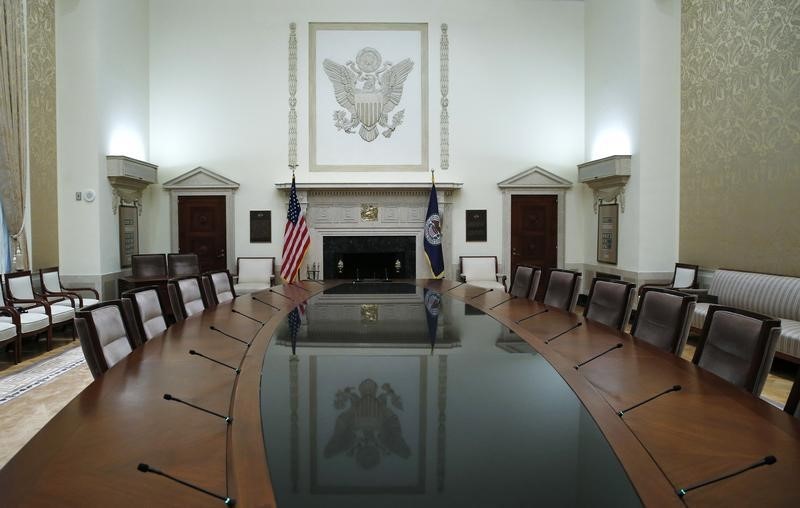Investing.com - Here are the top five things you need to know in financial markets on Wednesday, February 21:
1. Fed FOMC Meeting Minutes
Investors will be looking closely at the the Federal Reserve minutes of its most recent policy meeting, scheduled for release on Wednesday at 2:00PM ET (1900GMT).
The U.S. central bank left interest rates unchanged following its meeting on Jan. 31, the last under the leadership of Janet Yellen, and said inflation was likely to rise this year. Those comments signaled that borrowing costs will continue to climb under new central bank chief Jerome Powell.
The Fed is scheduled to hold its next policy meeting on March 20-21, with interest rate futures pricing in an 82% chance of a rate hike at that meeting, according to Investing.com's Fed Rate Monitor Tool.
A recent batch of stronger-than-expected U.S. inflation data has bolstered bets that the Fed could increase interest rates as many as four times this year, more than the three it currently forecasts.
2. Global Markets Mixed
Global markets were mixed on Wednesday, as investors look ahead to the Fed FOMC meeting minutes.
Asian stocks were up on Wednesday, with Japan’s Nikkei 225 rising 0.21% while South Korea’s KOSPI increased 0.60% and Hong Kong’s Hang Seng surged 1.81%
In Australia, stocks were flat. Chinese markets will open Thursday after being closed most of the week for the New Year.
In Europe, stocks were down. In Germany the DAX fell 0.88% as of 5:13 AM ET (10:13 GMT) while France’s CAC 40 decreased 0.67% and in London the FTSE 100 lost 0.34%. Meanwhile Spain’s IBEX 35 slumped 11.19% and the pan-European Euro Stoxx 50 inched down 0.82%.
Wall Street closed in the red on Tuesday, as the owner of America’s largest brick-and-mortar store, Wal-Mart Stores Inc (NYSE:WMT), had its worst day since 1988. Shares of the retailer fell over 10% after it reported a fall in profit and online sales amid pressure from online retailer Amazon (NASDAQ:AMZN).
U.S. futures pointed to a lower opening bell. The S&P 500 futures fell 0.17% while Dow futures decreased 0.22%. Meanwhile tech heavy Nasdaq 100 futures was down 0.09%.
3. Dollar Rises Ahead of Fed Minutes
The U.S. dollar rose to a one-week high ahead of the Fed minutes.
Any sign of a faster pace of monetary tightening could boost the greenback, which has been weakened in recent months.
Concern over corporate tax cuts and increased government spending impacting the U.S. fiscal deficit has weighed on the dollar. The deficit is expected to surge to nearly $1 trillion in 2019.
The U.S. dollar index, which measures the greenback’s strength against a basket of six major currencies, was up 0.12% to 89.75.
The index has climbed higher after it sank to a low of 88.15 on Friday, the weakest since December 2014.
4. UK Jobless Rate Inches Up
The UK unemployment rate rose from its lowest level in December, undermining the possibility of the Bank of England rising interest rates at its next policy meeting.
The Office for National Statistics said that the rate of unemployment rose to 4.4% in the three months to December, up from 4.3%.
Meanwhile, the average earnings index, including bonuses, rose by a seasonally adjusted 2.5% in the three months to December, unchanged from the preceding three-month period.
Excluding bonuses, wages rose by 2.5%, following a 2.3% increase in the three months to November.
The numbers show that inflation has increased at a higher rate than wage growth, as a weaker pound has put pressure on UK households.
5. Bitcoin Struggles to Stay Over $11,000
Bitcoin rose after losing steam in Asian trading on Wednesday as it struggles to stay over $11,000.
Bitcoin was trading at $11,170 on the Bitfinex exchange, gaining ground from its earlier losses but still down 1.44% from its daily high of $11,724.
The cryptocurrency has rebounded after falling to a two month low of $6,000 on February 6 amid regulatory concerns. Still, the price is 20% lower for the year to date.
Digital currencies have been bolstered by recent comments from regulators on the need for balancing regulation with consumer protection.
In South Korea, Financial Supervisory Service chief Choe Heung-sik said that there was a need for normalization rather than increased regulation. Last week the South Korean government said it would allow the trading of cryptocurrencies rather than an outright ban, which was welcome news to investors.
